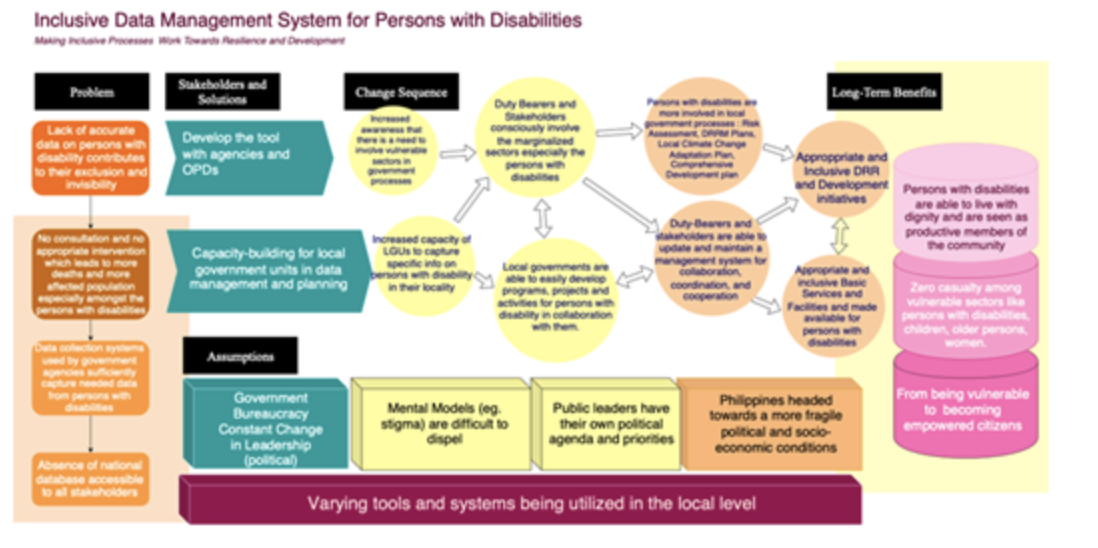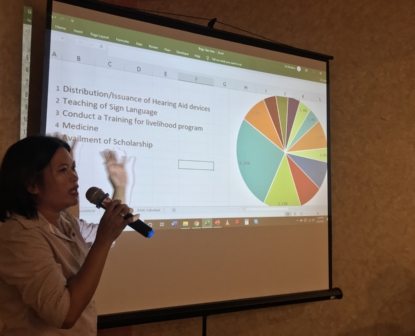Project
Inclusive Data Management System for Persons with Disabilities
-
Amount Funded
200,000 EUROProject Duration
01 Aug 2018 - 31 Jan 2020 -
-
Lead organisation
-
Center for Disaster Preparedness Foundation (CDP) is a nonpartisan, non-government organisation with principles cemented in the development and empowerment of communities especially those members of society that belong to at-risk sectors, like women, indigenous peoples, children, the elderly, and people with disabilities. The organisation continuously seeks to bridge the gap between duty-bearers and rights-holders through the promotion of Community-Based Disaster Risk Reduction and Management (CBDRRM). CDP believes that CBDRRM is a social development process that is inherently inclusive and participatory and thus serves as a venue for service providers and community members to work together toward a more sustainable and resilient future.
-
Organisation
Center for Disaster Preparedness Foundation (CDP) is a nonpartisan, non-government organisation with principles cemented in the development and empowerment of communities especially those members of society that belong to at-risk sectors, like women, indigenous peoples, children, the elderly, and people with disabilities. The organisation continuously seeks to bridge the gap between duty-bearers and rights-holders through the promotion of Community-Based Disaster Risk Reduction and Management (CBDRRM). CDP believes that CBDRRM is a social development process that is inherently inclusive and participatory and thus serves as a venue for service providers and community members to work together toward a more sustainable and resilient future.
-
Project
The Inclusive Data Management System for Persons with Disabilities project promotes the inclusion of persons with disabilities in planning, budgeting, and other development processes of local government and agencies, particularly in disaster risk reduction management (DRRM). Its intended outcome is the increased capacity of local governments to capture specific information on persons with disabilities in their localities. This project collects and records information on disability and disaster risk reduction management (DRRM) through by using the Kobo Collect, an open source Android application used in primary data collection for challenging environments. Ultimately, the intended output of the project is the establishment of a comprehensive data management system for persons with disabilities at the municipal or city level.
-
-
The Inclusive Data Management System for Persons with Disabilities project promotes the inclusion of persons with disabilities in planning, budgeting, and other development processes of local government and agencies, particularly in disaster risk reduction management (DRRM). Its intended outcome is the increased capacity of local governments to capture specific information on persons with disabilities in their localities. This project collects and records information on disability and disaster risk reduction management (DRRM) through by using the Kobo Collect, an open source Android application used in primary data collection for challenging environments. Ultimately, the intended output of the project is the establishment of a comprehensive data management system for persons with disabilities at the municipal or city level.
-
The Center for Disaster Preparedness or CDP have pushed for inclusive data management systems (IDMS) through their Innovate and Learn project. Opting for a more community-driven approach, persons with disabilities (PWDs) were trained to be co-implementers of data gathering and disabled people’s organizations were consistently consulted. The exploration was guided by a set of questions that sought to reveal gaps in knowledge about PWD access to various services and opportunities. The guiding questions were as follows:
- What are the barriers or hindering factors, and good practices in gathering data about persons with disability?
- What is the implication to the recognition and visibility of persons with disability if data is not gathered accurately?
- What is the implication to persons with disability in terms of accessing social services and resources if data is not gathered accurately?
- What is the implication to persons with disability in terms of participation and inclusion in decision-making and planning processes if data is not gathered accurately?
Along the way and towards the end of their project, they were able to achieve the following as answers to their explorative questions:
- The Inclusive Data Management System: A Guide to Disability-Inclusive and Data-Driven Local Government Planning will provide guidance to local government units, government agencies, and civil society organizations on how to undertake data collection, management, and analysis so that local plans are more inclusive and are responsive to the needs, issues, and concerns of persons with disability.
- The project team has set up a webpage: https://www.cdp.org.ph/online-courses hosted on CDP’s website where a free online course in Inclusive Data Management System will be made available once the 27 training videos are produced. This online course is free and accessible to all. This complements the IDMS Guidebook which was also revised so that it presents and contains contents parallel to the outline, lessons, and skills included in the training videos.
- Kamustahan sa Gitna ng Krisis (Check-ins Amidst the Crisis) proved that one does not have to be a mental health professional to conduct MHPSS and help people. CDP was able to conduct sessions. Members of Loving Presence and Las Piñas Persons with Disability Federation were able to learn simple steps so they could, on their own, perform activities to give relief from stress, let them discover their inner strength and resilient attributes, and practice self-care activities whenever they feel stressed and burnt out.
- Las Piñas Persons with Disability were able to apply for programs in response to COVID-19 pandemic by submitting their own data from disability sector within Las Piñas.
- Kagawad Asuncion Iñigo from Brgy. San Isidro Tagum City, who joined the Data Management Training of Bislig City LGU in Butuan City in March 2020, was also able to allocate funds and resources from different fund sources of their IRA for use in IDMS.
Throughout the implementation the learning questions have guided exploration and that has been visualized in a Theory of Change presantation:

“If my visibility offers just one person a new point of view on the disabled experience, whether they’re learning something new or seeing themselves reflected for the first time, then, my efforts have been worth it.” – RhG quoted from the IDMS Guidebook Foreword
Links to outputs
Disability Inclusive Data Guide: https://app.box.com/file/828787561910?s=ygt1e69fhnskon515os1wtjyygjxlii6
Online Courses: https://www.cdp.org.ph/online-courses
Zoom Webinar on Making Disability Visible:
https://shoutout.wix.com/so/5bNXNc6ur?languageTag=en#/main
Voice blog: https://voice.global/stories/an-inclusive-response/
Article on pilot-testing: https://www.cdp.org.ph/news-1/idms-pilot-testing-results-for-las-pi%C3%B1as-and-bislig-city
Disability Inclusive Data Results (a survey done at the onset of the pandemic): https://datastudio.google.com/u/0/reporting/1OjE6Q32qwpzsp9atbHWCFLP4SpuVfp-5/page/CYyMB?s=hO3O2MW-Rvg
-
News





